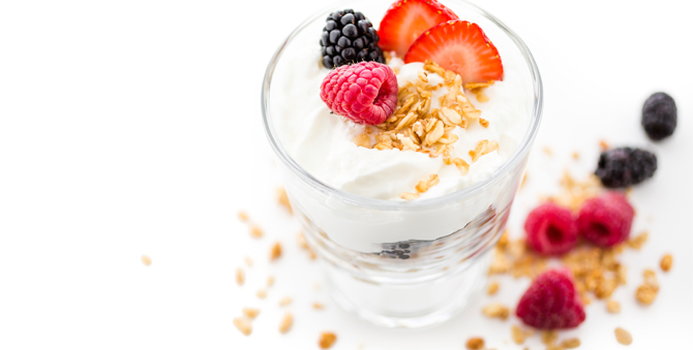We often think of bacteria as being negative; after all, we use antibacterial soap and antibacterial cleaning products to protect ourselves from getting sick, and use antibiotics to heal infections. But in recent years, scientists have learned more about the importance of some health-promoting bacteria found in the gastrointestinal (GI) tract. These good bacteria can help break down food, aid absorption of nutrients, promote immunity, and even affect our mood.
In the GI tract, we have over 500 different strains of bacteria, both good and bad, and the makeup and balance of these bacteria is what can impact overall health of the entire body. When the balance is disturbed - from either the reduction of beneficial bacteria, or the increase of bad bacteria, there is a greater chance of that harmful bacteria causing illness or disease. Taking antibiotics is the most common cause of the loss of good bacteria, while poor nutrition, lack of sleep, and stress over time can lead to an increase in harmful bacteria.
Probiotics can be found in foods like yogurt, kefir, tempeh, and other fermented products like kombucha tea, sauerkraut, miso soup, and kimchi. You can also find them in supplement form, in capsules or powders. Probiotic supplements are live microorganisms (like bacteria and also yeast) that are similar to those found in the human gut. Supplements are used to increase the amount of good bacteria in hope of restoring the balance of the gut, and have been shown to reduce symptoms from irritable bowel syndrome, diarrhea, and inflammatory bowel disease. The best evidence to support supplementation is for reducing cases of diarrhea, especially associated with the use of antibiotics. Taking probiotics may relieve associated symptoms or shorten the duration of these conditions. There is also the possibility of other benefits, like increasing the production of antibodies to certain vaccines, producing substances that prevent infection, and improving symptoms of eczema. While more research is needed in these areas, taking a probiotic supplement is generally recognized as safe and should not be harmful to a healthy person.
The idea behind supplementing probiotics is to increase levels of beneficial bacteria, but another approach is to help those already in the gut by increasing intake of prebiotics. Prebiotics are non-digestible carbohydrates that provide food for the beneficial bacteria and stimulate growth. Food sources include beans, garlic, onions, bananas, and leeks, but they are also added as supplements to food, and increasingly to baby formula.
If you decide to use a supplement, keep in mind that no two strains of bacteria are alike, so the effects of each probiotic depends on the strain used. Certain strains have been shown to have different benefits, so it's important to research the type that you are interested in taking. You may have to try different brands to find one that relieves your symptoms. Because probiotics are considered dietary supplements, they are not regulated by the FDA, so choose a brand that has been studied and proven to be effective. Check with your doctor to make sure taking probiotics or prebiotics will not interfere with any current medications and that it is safe for you to do so.

Carolyn McAnlis, RDN, is a Registered Dietitian Nutritionist who has a special interest in preventing chronic disease through nutrition. She graduated from Syracuse University with a Bachelor of Science in Nutrition Science & Dietetics and a minor in Psychology. After completing a full-time dietetic internship at the University of Virginia Health System, she has developed a passion for convincing others that healthy food can be delicious through her blog A Dietitian in the Kitchen.



